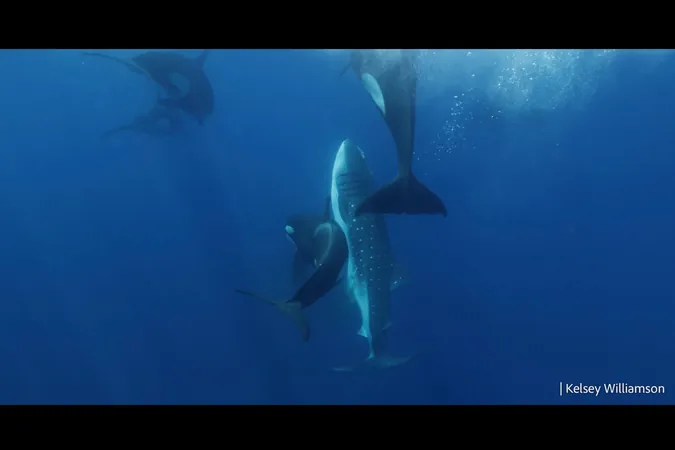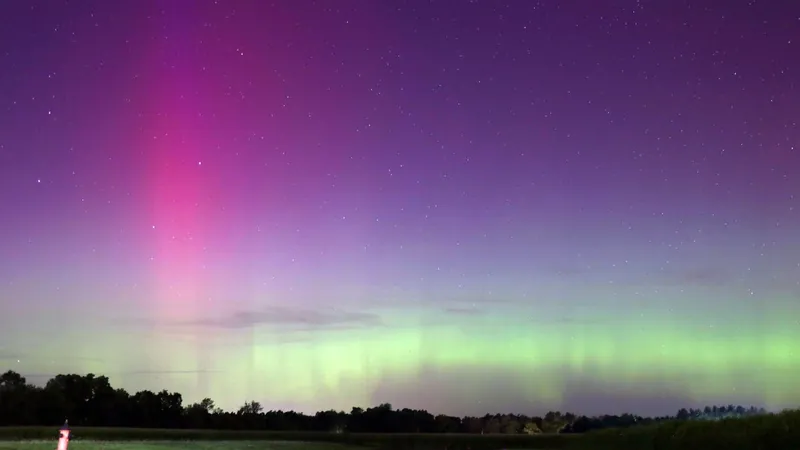
Shocking Discovery: Orcas in Mexico Master the Art of Hunting Giant Whale Sharks!
2024-11-29
Author: Yan
Introduction
Orcas, also known as killer whales (Orcinus orca), have revealed a startling new behavior that challenges everything we thought we knew about these majestic creatures. Recent research has confirmed that a pod of orcas in the Southern Gulf of California has learned to hunt and kill whale sharks (Rhincodon typus), the world's largest fish!
Astonishing Hunting Techniques
This dramatic revelation comes from marine biologists who studied orca behaviors over six years, documenting multiple attacks on whale sharks. Interestingly, a male orca named Moctezuma has emerged as a key player in this fascinating hunting strategy. While orcas are often portrayed as friendly in documentaries and movies, they are apex predators, known to hunt various marine life, but this marks the first confirmed account of them targeting whale sharks specifically—an astonishing feat considering the sheer size of these gentle giants.
Size Comparison
Adult orcas average about 20 feet (6 meters) in length and can weigh approximately six tons, whereas whale sharks can reach lengths of up to 45 feet (13.7 meters) and weigh up to 20 tons. Typically, whale sharks face no significant natural predators, making this new orca hunting technique all the more remarkable.
Detailed Research Findings
The study, published in the journal *Frontiers in Marine Science*, showcases detailed photo and video evidence of four distinct hunting events that took place between 2018 and 2024. The researchers found that these orcas displayed cooperative hunting techniques, focusing their attacks on the pelvic region of the whale sharks. This approach seemed particularly effective, as it led to significant bleeding in the sharks, making it easier for the orcas to access the nutrient-rich liver that they desire.
Collaborative Hunting Behavior
Dr. Erick Higuera Rivas, a marine biologist involved in the study, stated, “The orcas collaboratively turned the whale shark upside down, inducing a state of tonic immobility, which rendered the shark unable to escape.” This strategic team hunting underscores a complex social behavior among the orcas, suggesting a sophisticated level of learning and possibly cultural transmission within their pod.
Implications and Conservation
Moreover, the presence of Moctezuma and his accompanying female orcas points to the possibility that this pod could be uniquely specialized in whale shark hunting, raising intriguing questions about orca behavior elsewhere in the world. Are other orca pods across the globe also adopting similar strategies?
Ecological Impact
The implications of these findings extend beyond orca behaviors; they touch on vital conservation issues. As the population dynamics of whale sharks in the Gulf could shift significantly, any drop in their numbers may jeopardize the entire ecosystem. This interaction calls for heightened awareness and protection of both whale sharks and their orca hunters, emphasizing the delicate balance of marine life.
Conclusion
With much of the ocean still unexplored, revelations like these remind us that our understanding of marine ecosystems is still evolving. The ocean hides a treasure trove of secrets, and the complex dynamics between these impressive creatures are just beginning to be understood. What other secrets lurk beneath the waves, waiting to be discovered? Stay tuned for more updates on the incredible life of orcas and their newfound hunting prowess!

 Brasil (PT)
Brasil (PT)
 Canada (EN)
Canada (EN)
 Chile (ES)
Chile (ES)
 España (ES)
España (ES)
 France (FR)
France (FR)
 Hong Kong (EN)
Hong Kong (EN)
 Italia (IT)
Italia (IT)
 日本 (JA)
日本 (JA)
 Magyarország (HU)
Magyarország (HU)
 Norge (NO)
Norge (NO)
 Polska (PL)
Polska (PL)
 Schweiz (DE)
Schweiz (DE)
 Singapore (EN)
Singapore (EN)
 Sverige (SV)
Sverige (SV)
 Suomi (FI)
Suomi (FI)
 Türkiye (TR)
Türkiye (TR)